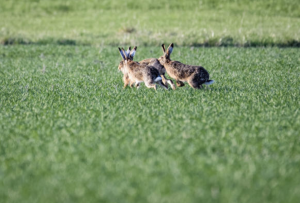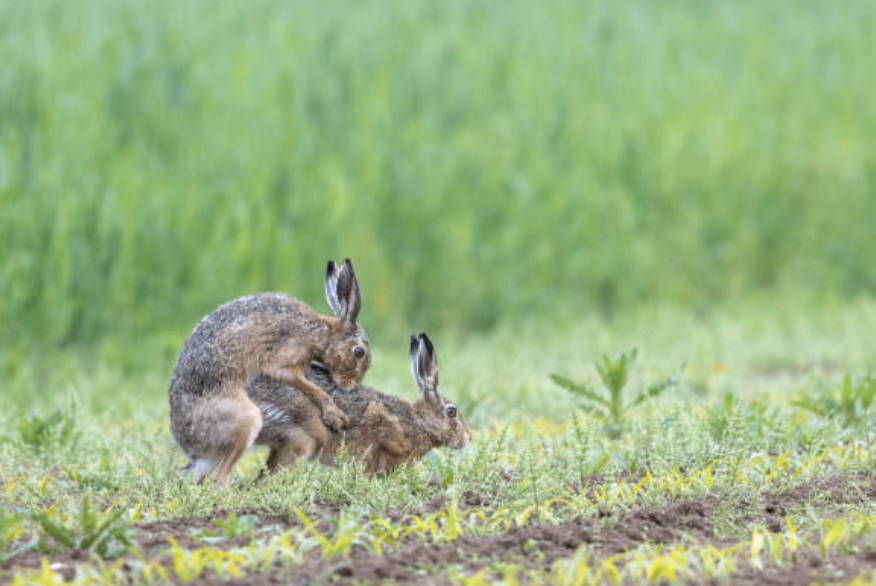Introduction – Do Rabbits Mate for Life
Do Rabbits Mate for Life? Have you ever wondered about the romantic lives of rabbits? These fluffy creatures, known for their rapid reproductive abilities, have often piqued the curiosity of nature enthusiasts and pet owners alike.
Today, we delve into the intriguing world of wild rabbits and explore their mating behavior. Specifically, we aim to answer the burning question: Do rabbits mate for life?
Wild Rabbits and Their Mating Behavior
Overview of Wild Rabbits
Before we delve into their romantic escapades, let’s take a moment to understand the lives of wild rabbits. Rabbits belong to the family Leporidae and are known for their incredible agility and ability to reproduce at a remarkable pace.
While there are various species of wild rabbits, they generally exhibit similar patterns of behavior when it comes to mating.
Mating Habits (Do Rabbits Mate for Life)
Wild rabbits are not monogamous creatures. Unlike some animals that form long-lasting pair bonds, such as swans, rabbits engage in multiple mating encounters throughout their lives.
The males, known as bucks, are particularly driven to mate and will often compete for the attention of females, referred to as does.
Mating System (Do Rabbits Mate for Life)
Rabbits employ a polygynandrous mating system, which means that both males and females have multiple partners within a breeding season.
This system ensures genetic diversity within the rabbit population and increases the chances of successful reproduction. In this competitive scenario, bucks engage in fierce battles to establish dominance and gain access to mates.
Mating Season
The mating season for wild rabbits varies depending on the species and geographical location. However, it generally occurs during the spring and summer months when environmental conditions are favorable for the survival of the young.
During this period, hormones surge within the rabbit community, triggering intense courtship behaviors and mating rituals.
Conservation Efforts (Do Rabbits Mate for Life)
Understanding the mating behavior of wild rabbits is crucial for conservation efforts. As human activities continue to impact natural habitats, it is vital to preserve the genetic diversity of rabbit populations.
By protecting their mating grounds and ensuring their survival, we contribute to the ecological balance of our ecosystems.
Why Do Rabbits Mate So Much?
Now that we have explored the mating habits of wild rabbits, you might be wondering why they engage in such frequent and intense mating activities. The primary reason behind their behavior lies in their survival strategy.
Rabbits are prey animals, and their ability to reproduce rapidly helps counteract the high predation rates they face in the wild.
By producing numerous offspring, rabbits increase the likelihood that some will survive and carry on their genetic lineage.
Moreover, their ability to reproduce quickly allows them to take advantage of favorable environmental conditions, such as an abundance of food and shelter. This ensures the continuation of their species even in challenging circumstances.
Do Domestic Rabbits Mate for Life? – Do Rabbits Mate for Life
While wild rabbits have a promiscuous mating system, the behavior of domesticated rabbits can differ. Domestic rabbits, often kept as pets, do not exhibit the same natural instincts as their wild counterparts.
Instead, their mating behavior is often influenced by human intervention, breeding programs, and the controlled environment in which they live.
In some cases, domestic rabbits can form pair bonds and exhibit monogamous behavior. However, this is not the norm. It is more common for domestic rabbits to engage in occasional mating encounters, especially when a female is in heat.
Due to the absence of natural predators and the availability of a stable food source, domestic rabbits do not face the same pressures to reproduce rapidly as wild rabbits do.
Do Rabbits Mate with Their Siblings? – Do Rabbits Mate for Life
The question of whether rabbits mate with their siblings is an important one, particularly when considering breeding programs and genetics. In the wild, rabbits tend to disperse from their birthplace, reducing the likelihood of mating with their siblings.
This natural behavior helps prevent inbreeding and maintains genetic diversity within the population.
However, in domestic settings, where rabbits may live in close proximity to their relatives, the risk of inbreeding exists if proper precautions are not taken. Inbreeding can lead to a higher incidence of genetic disorders and health problems in offspring.
Responsible rabbit breeding programs prioritize genetic diversity and avoid mating closely related individuals to ensure the well-being of future generations.
Are Pet Rabbits Monogamous?
When it comes to pet rabbits, many owners wonder if their fluffy companions exhibit monogamous behavior. While domestic rabbits can form close relationships with their human caregivers, their mating behavior may not mirror that of their wild counterparts.
Pet rabbits, influenced by their controlled environment and human interaction, may exhibit varied mating patterns.
Reasons That Rabbits Are Not Monogamous – Do Rabbits Mate for Life
The reasons behind rabbits’ non-monogamous behavior can be attributed to their survival instincts and reproductive strategy. In the wild, rabbits face high predation rates, and their ability to reproduce rapidly helps counteract the loss of individuals due to predation.
By engaging in multiple mating encounters, rabbits increase the chances of producing offspring that will survive and carry on their genetic lineage.
Moreover, rabbits have adapted to take advantage of favorable environmental conditions. When resources such as food and shelter are abundant, rabbits seize the opportunity to reproduce and ensure the continuation of their species.
Their ability to reproduce quickly is a crucial survival mechanism that has allowed rabbits to thrive in various habitats around the world.

How to Take Your Rabbit to the Vet: A Step-by-Step Guide
As responsible pet owners, it is important to ensure the well-being of our furry companions. Regular veterinary care is essential for maintaining the health of pet rabbits. Here is a step-by-step guide on how to take your rabbit to the vet:
- Research and choose a rabbit-savvy veterinarian in your area. Rabbits have unique medical needs, so it is important to find a vet experienced in treating rabbits.
- Prepare a comfortable carrier for your rabbit. Use a secure carrier with good ventilation and enough space for your rabbit to move comfortably.
- Familiarize your rabbit with the carrier. Gradually introduce your rabbit to the carrier by placing treats or familiar bedding inside. This will help reduce stress during the vet visit.
- Schedule an appointment with the veterinarian. Explain the reason for your visit and any specific concerns you have regarding your rabbit’s health.
- Transport your rabbit to the vet’s office. Place your rabbit in the carrier and secure it in your vehicle. Drive carefully, ensuring a smooth and stress-free ride for your rabbit.
- During the vet visit, communicate any relevant information about your rabbit’s health and behavior. Be prepared to answer questions about your rabbit’s diet, exercise routine, and any changes in behavior or appetite.
- Follow the veterinarian’s recommendations for preventive care and treatment. Ask for any necessary vaccinations, parasite control, or dental care your rabbit may require.
Remember, regular veterinary check-ups are crucial for maintaining the overall well-being of your pet rabbit and addressing any potential health issues early on.
Read also – Spiritual meaning of Rabbit crossing your path
What Rabbit Breed Do Magicians Use? – Do Rabbits Mate for Life
Magicians have captivated audiences with their mysterious acts for centuries, and rabbits have often played a part in their performances. The most commonly used breed of rabbit in magic acts is the Netherland Dwarf.
Known for their small size and adorable appearance, Netherland Dwarfs are easily manageable and can be comfortably concealed in magician’s hats or hidden within their props.

The choice of Netherland Dwarfs in magic acts is also influenced by their docile and friendly nature. These rabbits are generally calm and tolerate being handled, making them ideal companions for magicians during their tricks and illusions.
It’s important to note that responsible magicians prioritize the welfare and proper care of their rabbits. The well-being and safety of the animals are of utmost importance, and professional magicians ensure that their rabbits receive proper veterinary care, adequate housing, and a nurturing environment.
| Mating Types | Description |
|---|---|
| Monogamous | In this type of mating, rabbits form long-lasting pair bonds and remain with the same partner. |
| Polygamous | Rabbits engage in multiple mating encounters and do not form long-term pair bonds. |
| Polygynous | Male rabbits mate with multiple females during the breeding season, but females have only one mate. |
| Polyandrous | Female rabbits mate with multiple males during the breeding season, but males have only one mate. |
| Promiscuous | Both male and female rabbits have multiple partners without forming lasting bonds. |
| Monogynous | Male rabbits have only one mate during the breeding season, while females have multiple partners. |
| Monandrous | Female rabbits have only one mate during the breeding season, while males have multiple partners. |
FAQs – Do Rabbits Mate for Life
Do rabbits stay with the same partner?
No, rabbits do not stay with the same partner. They follow a polygynandrous mating system and engage in multiple mating encounters throughout their breeding season.
Will a male rabbit mate with its mother?
Yes, male rabbits may mate with their mother if they are not separated. In domestic settings, it is important to prevent such mating to avoid inbreeding and potential health issues in offspring.
How many times do you mate a rabbit?
There is no set number of times to mate a rabbit. It is recommended to allow rabbits to mate naturally during the female’s breeding season. Overbreeding can be stressful for the rabbits, so it is crucial to prioritize their well-being.
Do rabbits stay together as a family?
In the wild, rabbits do not stay together as a family unit. Once the young rabbits, known as kits, are independent, they disperse and establish their own territories.
Can 2 male rabbits be kept together?
Yes, two male rabbits can be kept together under certain circumstances. It is important to ensure they are neutered to avoid territorial aggression and fights. Introducing them gradually in a neutral territory can also help establish a harmonious relationship.
Can two rabbits be together?
Yes, two rabbits can be kept together, provided they are properly introduced and have compatible personalities. It is recommended to have them both spayed or neutered to prevent unwanted breeding and reduce the risk of aggression.
Regular monitoring and attention to their well-being are essential.
Conclusion – Do Rabbits Mate for Life
In conclusion, wild rabbits do not mate for life. Instead, they follow a polygynandrous mating system, engaging in multiple mating encounters throughout their breeding season.
This behavior allows them to adapt to their environment and ensure the survival of their species. On the other hand, domestic rabbits, influenced by human intervention, may exhibit more varied mating behavior, including occasional monogamous pair bonds.
Understanding the mating behavior of rabbits is essential for wildlife conservation and responsible rabbit breeding programs. By preserving the genetic diversity of wild populations and avoiding inbreeding in domestic settings, we can contribute to the well-being and sustainability of these adorable creatures.
So, next time you observe rabbits hopping about, remember the fascinating intricacies of their romantic lives and the role they play in our natural world.
